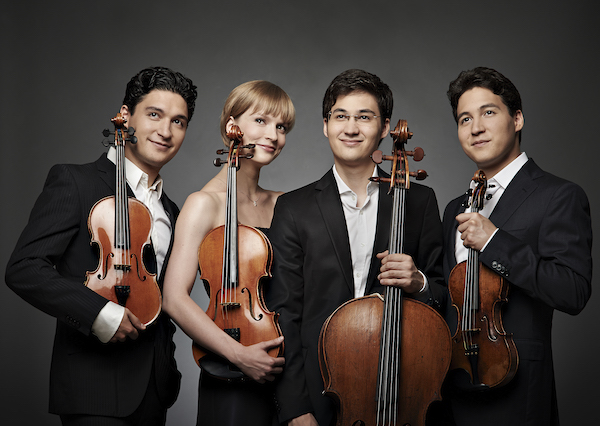Schumann Quartet gets serious in Chamber Music Society program

Happily, the term “serious music” has gone out of fashion to describe the kind of music reviewed every week on this website. But on Friday night in Alice Tully Hall, one could understand how the usage got started.
Seriousness of intent fairly dripped down the walls as the Schumann Quartet, presented by the Chamber Music Society of Lincoln Center and briefly joined by soprano Tony Arnold, gave polished performances of aspirational music by Mozart, Berg, and Grieg.
A creature of the galant musical fashions of his time, Mozart came late to an appreciation of the contrapuntal majesty of Bach and Handel. Then he dived into a study of their music, emerging with his own Fugue in C minor for two pianos. Later he arranged the piece for strings and fitted it with a prefatory Adagio.
On Friday, the Adagio’s swooning phrases had a theatrical feel, as if one were listening to the overture to Don Giovanni II. In the Fugue, Mozart the apt pupil deftly wielded the inversions, stretti, and other tools of the contrapuntal trade without quite achieving the cumulative power of his Baroque models. (The fully realized contrapuntal splendor of the “Jupiter” Symphony would come later.) The quartet—brothers Erik, Ken, and Mark Schumann playing violins and cello respectively, with violist Liisa Randalu—gave the piece a smartly voiced and vigorous performance.
After Brahms’s Clara and Wagner’s Mathilde, it seemed as though one couldn’t be a serious composer without a lifelong, smoldering passion for an unattainable lover. In Alban Berg’s case, it was Hanna Fuchs-Robettin, wife of a wealthy Czech industrialist, for whom the composer secretly poured his feelings into the Lyric Suite of 1926.
George Perle, the composer and peerless Berg detective, uncovered the Lyric Suite’s hidden story 50 years later. With that endearing American habit of intervening in a European problem and making it right, he concluded that Berg had composed a vocal part for the last movement but suppressed it for fear of revealing the piece’s scandalous true meaning. Something had to be done about that, so Perle, following Berg’s handwritten annotations and instrumental lines, composed a restoration of the composer’s setting of “De profundis clamavi,” a poem by Baudelaire in a German translation by Stefan George.
Enter Tony Arnold on Wednesday night, with a creamy-toned, finely inflected performance of the George text, tailored to mesh with the quartet sound rather than stand out as a vocal solo. Whether one considered her part a needless intrusion, a helpful gloss, or the restoration of a masterpiece, there was no faulting her sensitive conveyance of George’s heartbroken poem.
While the Schumann Quartet’s ear for balance and attention to detail offered many pleasures over the piece’s six movements, their poised presentation didn’t probe very deep into this “latent opera” (as Theodor Adorno called it) of ecstasy, passion, catastrophe and despair.
Edvard Grieg was apparently spared this degree of turbulence in his love life, but he was subject to despair of another sort: the disappointment of feeling that, despite the popular success of his Piano Concerto and Peer Gynt, he might never join the Pantheon of “serious” composers with the likes of Beethoven and Brahms.
During the summer of 1877, Grieg withdrew to a house in the country, and later emerged with an eminently serious string quartet. With its blocky, homophonic textures and liberal use of double-stopping, the work was immediately criticized as a maladroit adaption of what was essentially piano music.
Grieg argued that, on the contrary, he’d invented a new way of writing for string quartet. Among those who agreed with him was Debussy, who 15 years later modeled his own String Quartet on Grieg’s.
Wednesday’s performance reveled in Grieg’s wall-of-sound sonorities, snapping many a bow hair along the way, and the folksy middle movements were enlivened by the group’s ear for detail and artful management of ever-changing tempos.
The outer movements, a sonata-form Allegro molto ed agitato and a whirling saltarello finale, pleased in detail but sounded choppy overall, never developing much internal momentum. Nevertheless, the polished and energetic performance brought enthusiastic applause at the end, prompting an encore, the minuet from Mozart’s “King of Prussia” Quartet in F major, K. 590.
The blessedly un-serious minuet, composed for the entertainment of a cello-playing king, brought the most flowing and graceful playing of the night.
The Chamber Music Society of Lincoln Center will present the Calidore String Quartet and bassist Xavier Foley in music of Bartók and Dvořák, 6:30 p.m. Thursday at Rose Studio, Lincoln Center. chambermusicsociety.org; (212) 875-5788.


